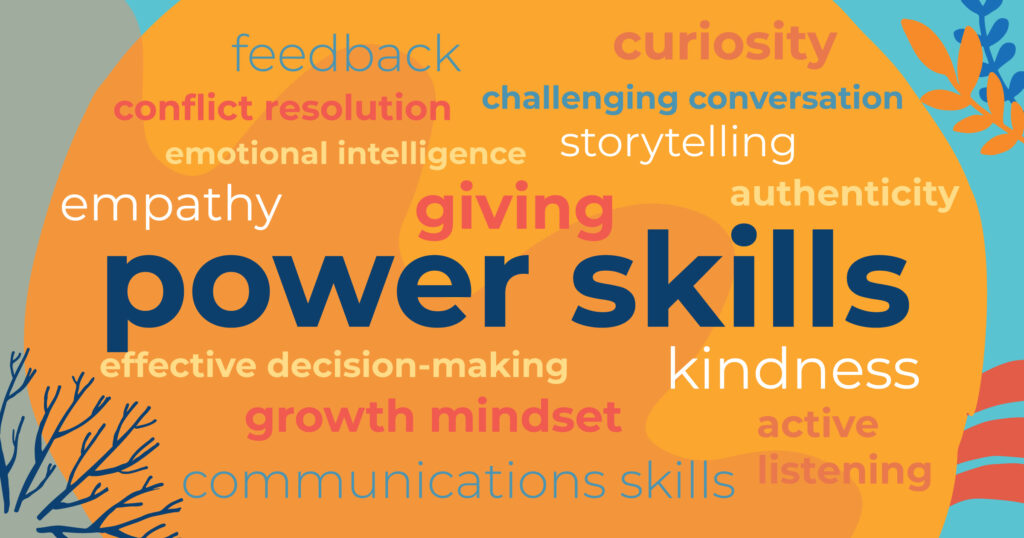Take a deep breath and imagine…a work environment where you can overcome challenges and feel supported by your entire organization…a place where employees are respected, happy, and fulfilled…a place where productivity and innovation are abundant.
Can you picture it? That’s a wonderful place, isn’t it?
What if I told you that one of the keys to unlocking an environment like this is both attainable and accessible, no matter where you sit in your organization? Sounds too good to be true, but it’s within your reach!
In this article, I’ll help you and your organization move toward a state of workplace harmony with 12 role-specific power skills tips.
- C-Suite: You’ll discover how to leverage power skills to future-proof your organization.
- Managers/Leaders: You’ll find ideas for how to embed power skills into your culture.
- Individual Contributors: You’ll see how to increase self-awareness and harness your own power skills.
Before we dive into actionable tips to improve power skills, let’s look at how these skills came to be.
What Are Power Skills? The Evolution of Soft Skills

Known as soft skills for 50-plus years prior, the term power skills was championed by Josh Bersin in 2019 after he listened to a speaker at a conference suggest that the name should reflect the power given to those who master these skills.1
As Bersin notes, “These skills are not ‘soft’—they’re highly complex, take years to learn, and are always changing in their scope. Take the number one skill CEOs ask for: ‘willingness to be flexible, agile, and adaptable to change.’ This alone is an enormous bag of personality traits, mindsets, abilities, and experiences.”
In the past two to three years, there’s been a meteoric rise in employees and companies focusing on upskilling. As they ready themselves to navigate our complex and ever-evolving world, skills that help people grow and organizations thrive—power skills—are in high demand.
In fact, on Forbes’ 2021 Top 10 Skills Recruiters Are Looking For list, every single skill was under the power skills umbrella. Growth mindset, continuous learning, and critical thinking took the top three spots.

Power skills can encompass empathy, authenticity, active listening, curiosity, growth mindset, kindness, effective conflict resolution, emotional intelligence, giving and receiving feedback, managing challenging conversations, storytelling, effective decision-making, and communication skills.
What’s at stake here? Companies that don’t prioritize power skills to prepare for the workplace of the future may struggle with collective issues related to conflict, mental health, burnout, employee engagement, and change management.2 They may also struggle with implementing effective DEIB (diversity, equity, inclusion, and belonging) strategies.3 These challenges can impact workplace culture and create a stressful and chaotic environment, which can distract learners and impede learning. Our brains can’t retain information as well when we are stressed.4
How You Can Leverage Power Skills
As you can see, power skills are powerful! The good news is, there are many simple things you can do right now to grow your skills and others’ no matter where you sit in the organization.
Are You in the C-Suite?

Here’s how.
- Partner with Learning and Development to complete a strategic-level needs analysis. Ask: What goals are critical to the company’s growth over the next three to five years?
- Identify which power skills will be necessary to drive those goals forward. Maybe you’ll need people with decision-making skills; perhaps prioritization or emotional intelligence will be top of the list.
- Share this list with L&D so they can conduct an inventory of the currently available resources (courses, subject matter experts, etc.) and identify gaps.
- Regroup to prioritize the upskilling initiatives that will close the gaps and move you closer to your strategic goals!
No L&D team at your organization? We’d be delighted to partner with you on this work. Contact us to share your business needs with us!
Are You in HR/Management?

How might we as HR/Leaders hold ourselves and others accountable?
- Set the standard. Develop guidelines and coaching guides for leaders to help model the behaviors and hold themselves and others accountable. For example, begin by asking what does empathy look like in your organization? How might it show up in different roles and departments? What does “good” look like? Make sure you are creating and protecting psychological safety.
- Educate. Run workshops or seminars that teach or highlight the importance of power skills. Involve your internal ambassadors and champions here. Make the sessions optional, but offer the recordings for people to view at their leisure. At SweetRush, we have a monthly “brown bag” webinar where experts and thought leaders from across the business share their expertise on various topics and disciplines with the entire company. Leverage your internal experts to upskill your organization.
- Share testimonials. Tap into vulnerability and authenticity by inviting individuals to share their personal experiences. Use your town hall or all-hands meetings to spotlight those who have grown and evolved using power skills and show how others in the organization can do the same.
- Consistent communication. Show that power skills are important by embedding them in your internal and external communications. Review your job descriptions and make sure that you are using the right language to attract candidates with the skills that align with your core values.
Are You an Individual Contributor? How Everyone Can Win with Power Skills

Who are you (really)? Learn more about your personality and what matters to you.
- Reflect. Have you ever considered how you appear to others? Is your interpretation of yourself in line with others’ interpretations of you? This is a tough one! It’s not always easy to look at ourselves and really dig deep to uncover some (perhaps uncomfortable) realizations. But if you are willing to do this, this is where the real magic can take place! Give yourself grace and space.
- Take a values assessment, such as the Barrett Values Centre’s Personal Values Assessment, and share your results with your team. Better yet, ask everyone on your team to take the assessment and share the results with each other. Get to know what motivates you and your teammates to identify areas for further development. If you’d like expert support, suggest to your manager or team lead to contact SweetRush’s Thrive team—we can help!
- Get an accountability partner. Whether it’s a professional coach, friend, or teammate, find someone who can hold you accountable for the goals you’ve set on your personal development journey. Want better conflict resolution skills? Make it a goal to learn and practice these skills, and share your wins and setbacks with your accountability partner.
- Find what speaks to you. What are you doing when you feel like your best self? Is it journaling, reading, golfing, hiking (to name a few)? Find whatever resonates with you and reinvigorates you so you can show up as your best self.
If you get this right, you can improve your relationships both professionally and personally—a total win-win!
At SweetRush, we’ve adopted a human-centered approach to foster our unified, creative, collaborative, high-performing team. Power skills—like empathy and storytelling—have been at the forefront of that effort. As our Cofounder and CEO Andrei Hedstrom says, “Serve your people so that they’re able to explore and express the truth, beauty, and goodness in them, and they’ll do amazing things.”5
Want to take your power skills (and organization) to the next level? Download our eBook, It’s All About Your People! Embracing Human-Centered Business, Workplace Culture, and Learning Design, to get there! Discover how to use power skills to create an environment where people thrive.
Remember, growing your power skills is not a one-and-done process. We constantly change as we learn and grow. If we are doing this right, this should be a lifelong journey. Enjoy the ride!
- https://joshbersin.com/2019/10/lets-stop-talking-about-soft-skills-theyre-power-skills/
- https://www.gallup.com/workplace/282659/employee-burnout-perspective-paper.aspx
- https://www.forbes.com/sites/forbeshumanresourcescouncil/2021/06/01/rewiring-the-workplace-mindset-of-diversity-equity-inclusion-and-belonging/?sh=2f86093621b3
- https://www.psychologytoday.com/us/blog/ritual-and-the-brain/201804/why-your-brain-stress-fails-learn-properly
- https://www.sweetrush.com/building-a-life-centered-business/





